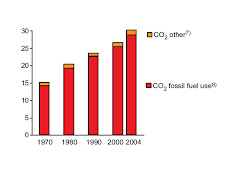I have learned so much by writing this blog. I fully understand the answer to my question, and I know that I can use what I now know to inform others and to continue to fight global warming. The most important thing that I have learned through this process is that it will take many different approaches to climate change to mobilize people.
Here is a brief summary of my answers: government action, incentive, personal risk, facts, consumer appeal, a connection to the economy, passion, and reaching out and informing. I have examples for all of these and explanations in my blog. Renewable energy is also going to be a major way for us to become less dependant on fossil fuels.
The consequences for inaction will be severe. The seas will rise, temperatures will increase, and humans will be left to fight an unbeatable war. This is why we need to act now. It is not impossible to win this battle. People are already acting all over the world. With international cooperation, we can save our planet. This goal is easily within our reach.
We all need to take responsibility for our own actions. Little things can make a difference: energy-saving light bulbs, fuel-efficient cars, energy-efficient technology, and much more. But, inevitably, enormous changes will be needed. Radical government policies will alter the course of our earth's climate. But, most importantly, it will be individual people that will make a difference. We will all have to make a choice. Most of us will choose to fight global warming, save the earth, and make a better future for our children. These people will change the course of history and become history. Like Eban Goodstein said: "What a time to be alive."
You don't need to be extremely educated on the issue to be involved. We will all be invested in stopping climate change. Whether you know the current emission of CO2 or not, you will still be making changes in your lives in pursuit of a common goal: ending global warming.
I literally can not express how much I love and have a passion for nature. When I read statistics that show how Americans simply don't care, I become extremely frustrated. I just can't see how people care about the economy more than the environment when 1) We live off the environment and 2) the economy will be a hundred times worse if we let climate change worsen. I think this message is what will mainly motivate people. I also think that the majority of the population of the world doesn't have enough information to be compelled to act. Therefore, the spreading of facts is crucial to catapulting global warming to the top of our concerns list.
Recently, for the Climate Action Club, I spent over three hours calling various places around the state to see if they recycled normal batteries. None of them did. From big box stores, to local business, nobody was helpful or informative on where I could recycle batteries. Here are some examples of what I went through and heard.
Staples recycles all kinds of batteries except normal, everyday AAA, AA, C, and D batteries. One employee told be that this was so because regular batteries aren't "eco-harmful." This is false because, at that same moment, I had been reading how much mercury is in normal batteries. At one Wal-Mart store, they had a policy where they recycled any type of battery that were bought in their store. Target advertised online that they recycled batteries. But, when I called three different Target stores, none of them had that service. For each store, as I waited for an employee to assist me, I heard the same recording telling me how important my call was.
This afternoon, I tried calling a local recycling business in Newcastle. Here is what our conversation sounded like:
Me: Hello, do you recycle batteries?
Him: What?
Me: Do you recycle batteries?
Him: No.
Me: Do you know where I can?
Him: No.
Me: Okay. Thank you very much.
Him: Yep.
There is practically no place in the state to recycle normal batteries. Most people just go in to a store and buy random, cheap, batteries because they don't want to spend the time or money on rechargeable batteries. I don't blame them, and I do the same thing. But, there has to be a place where we can take our old batteries for recycling instead of throwing them in a landfill. I think it is pitiful how little opportunity we have to recycle these batteries. We need to have these facilities in all our towns. This is an example of how we can tie our everyday lives to global warming. Just this simple action can make such a big impact. But, millions of people will have to do this in order for us to influence others and reverse climate change.
My mom recently sent me an e-mail that is the perfect example for this blog. Hannah Pingree is introducing a renewable energy legislation to the Utilities and Energy Committee in Augusta on February 12. Her bill "would...allow communities to develop shared green energy projects." It would also "develop incentives, including low interest loans, for consumers to make substantial home efficiency upgrades." This is absolutely thrilling to me because it verifies my answers. I found this solution through books, websites, and interviewing Jared. This tells me that what I found for my answers for this blog are very true and plausible. They are also being implemented at this moment. This is proof that we are on path that can lead us to a brighter future.
Monday, February 11, 2008
Subscribe to:
Post Comments (Atom)



No comments:
Post a Comment